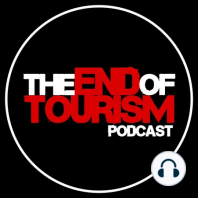10 min listen

S4 #6 - Decoding Degrowth & Boosterism in the Balearics w/ Macia Blazquez
S4 #6 - Decoding Degrowth & Boosterism in the Balearics w/ Macia Blazquez
ratings:
Length:
58 minutes
Released:
Oct 6, 2023
Format:
Podcast episode
Description
On this episode of The End of Tourism Podcast, my guest is Macià Blázquez-Salom, a professor at the University of the Balearic Islands, who specializes in the Geography of Tourism, Territorial Planning, Sustainability and Degrowth. He utilizes his teaching and research activity in the environmental movement (and vice versa), and through his activism in the Grupo Balear de Ornitología y Defensa de la Naturaleza (GOB) and Alba Sud.Show NotesMacia’s Journey in the BalearicsThe Beginning of Mass Tourism through Currency DevaluationContradictions in MallorcaCocoon Tourism in SpainYou Want to Work in the Balearics, You Have to Sleep in a TentBoosterism and Green BoosterismDegrowth Definitions and ContradictionsImagining Other Modes of TravelImagining Other Modes of ResistanceHomeworkGoogle Scholar: Macia BlasquezOrcid: Connecting Researchers with ResearchersMacia Blasquez’s UIB SiteTranscript[00:00:00] Chris: Welcome Macia, to the podcast. From what I've been able to dig up around your life and work that you've been studying, tourism and its contradictions for a very long time. Now, I'd like to ask you what drove you towards a career as a professor and critic of the tourism industry?[00:00:24] Macia: Well, in fact, even before finishing my degree, I was involved in social movements here in the Balearics, in Mallorca, particularly. I was member of the committee of the volunteers collaborating with the GOB, which is the biggest ecologist group. Then by the eighties and perhaps influenced by this collaboration, I decided to study geography and to analyze the relation in between tourism and natural conservation, because by then we had promotion after the tourism boom in the sixties and seventies.The eighties Spain became member of the European Union and some of our politicians, they decided and they were promoting the Balearics as second residents destination for north European people, and this means that investment in the real estate market even increased with foreign people buying second residencies and promoting as well the promotion of more urban development for this purpose.And that was written in the natural areas due to what we call "green" or "gray-grabbing" with new facilitation of land here in the Balearics. And this was the main aim I had to develop my research on this topic, with special planning and natural conservation in the Balearics.Afterwards we had what we called the real estate bubble that began in the nineties and burst in 2008. And that was a period when I was more involved, particularly in the social movements. In fact I feel more related with activism than with academia. After the crisis with my age, I took the decision of giving support to younger people in the social movements and devote more time to the academia with colleagues Ivan Murray or Ernest Canada or Robert Fletcher or Nora Muller, other people who are working in this research group in the University of the Balearics Islands. But I still working with the NGOs Alba Sud, particularly the GOB, and other social movements in this region in the Western Mediterranean region particularly. [00:03:03] Chris: I have some questions regarding these social movements that I think maybe we'll get to in just a bit.But, I'd like to try to offer a bit of context for our listeners in part because before I heard of your name and before I interviewed our mutual friend Ivan, for the first episode of the podcast, I don't think I had ever heard of Palma or Mallorca before, even as someone who had traveled through Europe and many other parts of the Mediterranean.And so I'm curious if you could give us a bit of background on how Palma came to be over touristed, or at the very least, what you've seen come to pass in your time there. I mean, I know it's, it is also historically has a lot of deep importance for the Spanish state and Mediterranean history culture.[00:03:55] Macia: I'm sure you have heard about the dictatorship of Franco in the forties, fifties. Mm-hmm. Fifties. He
Released:
Oct 6, 2023
Format:
Podcast episode
Titles in the series (53)
#0.1 | Dispatches From The Resistance by The End of Tourism